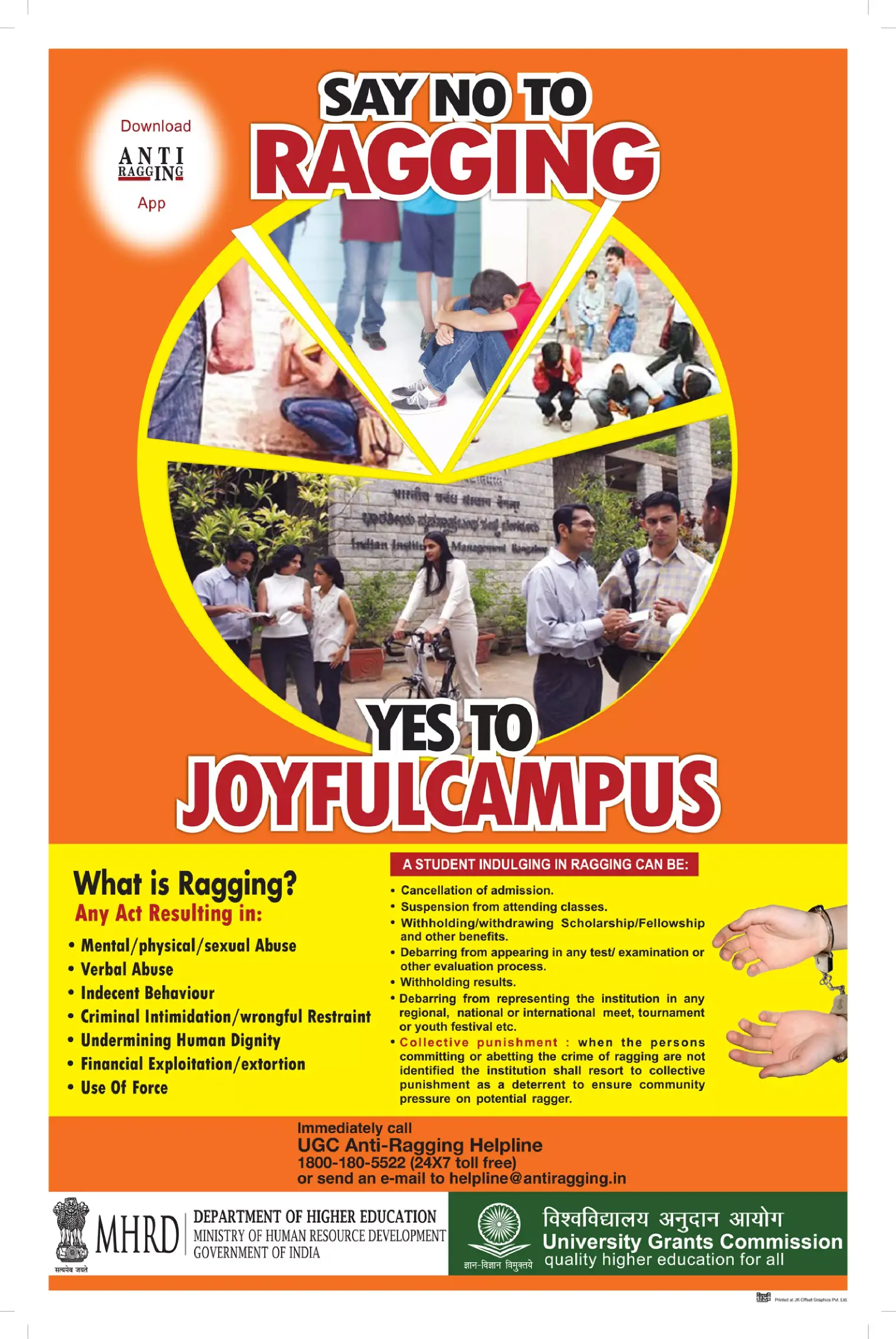
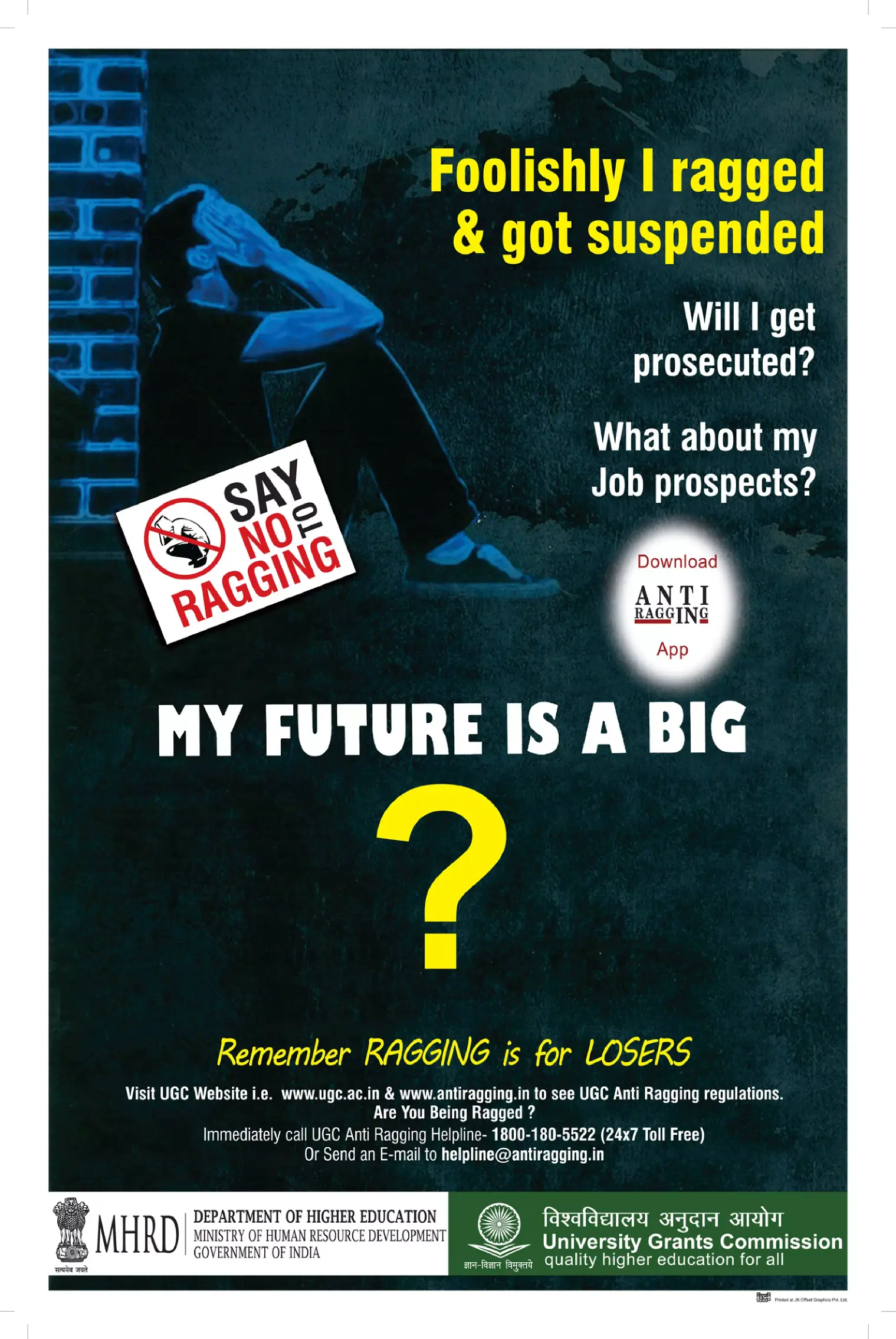
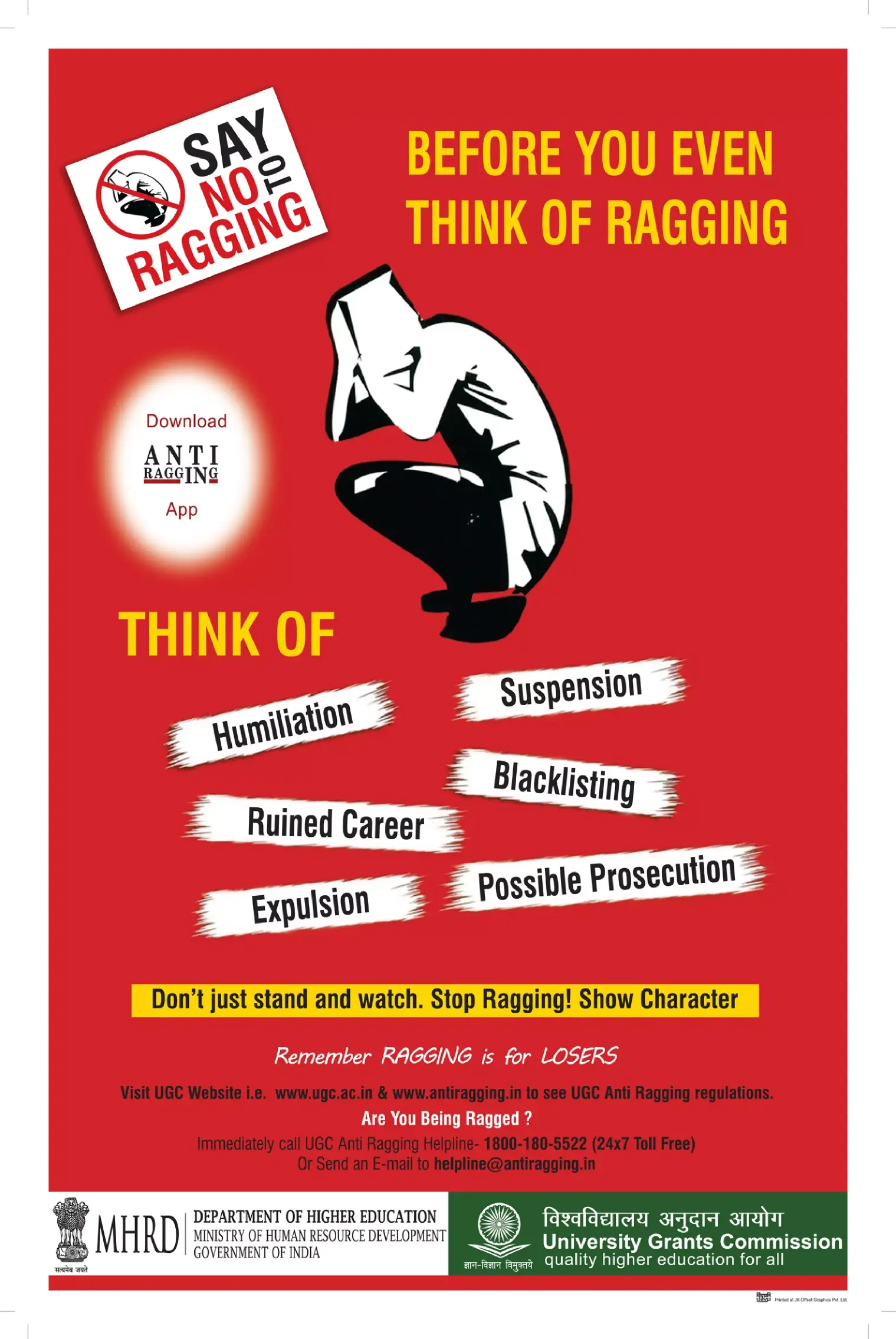
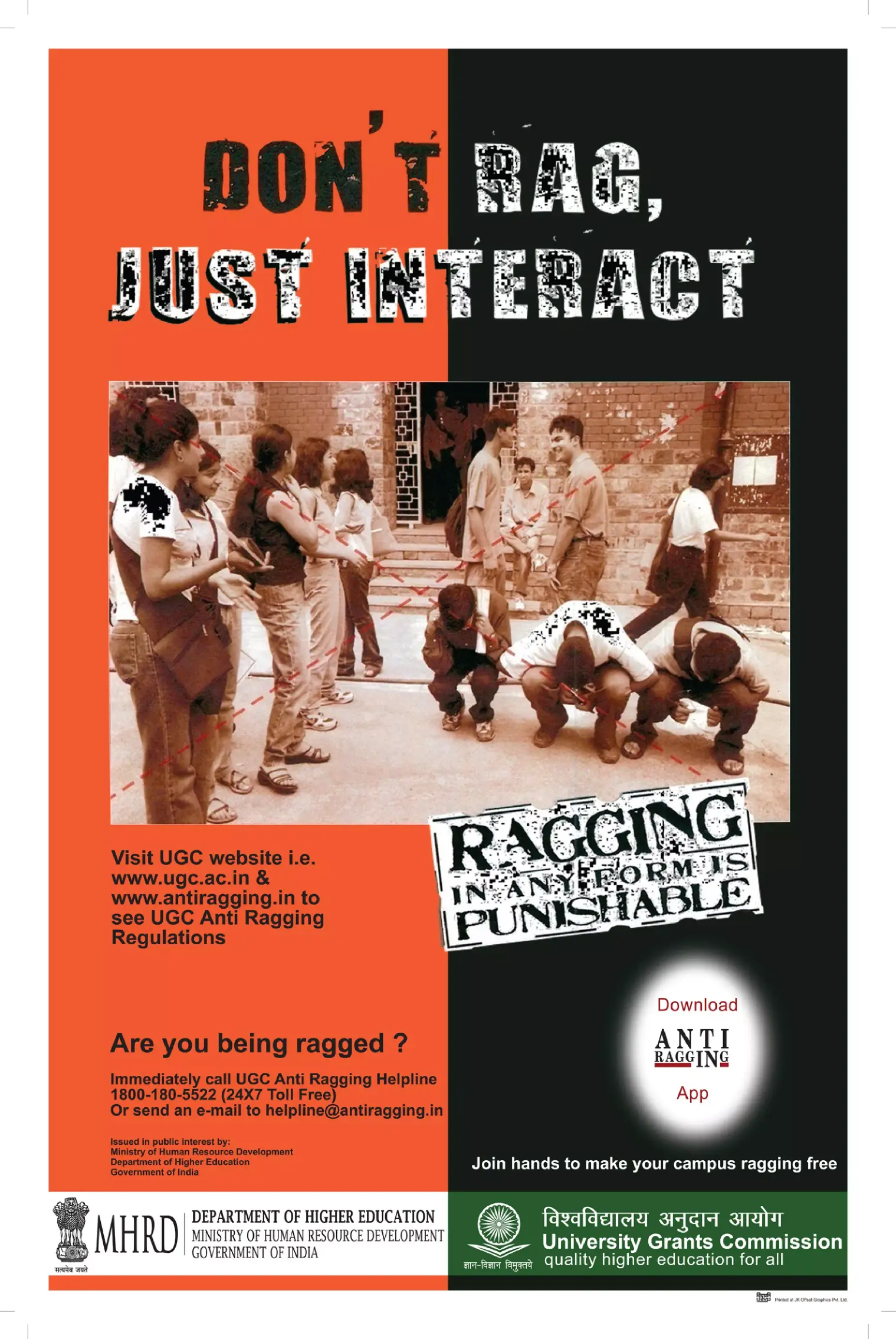
Anti-Ragging Regulations and Measures
Ragging and Anti Ragging
Act of Ragging is when senior students harass, abuse, or intimidate newcomers or Junior students. It frequently takes a malignant form, when newcomers in the institute may experience verbal, psychological or physical torture or abuse.
Ragging is a notorious practice in which senior students use the inferiority of their junior peers as an excuse to harass them and, most frequently, make them easy target for their own sick, sadistic pleasures. It is concealed by the pretext of "Welcoming" new college students. Those poor students who become victims of ragging not only suffer terrible bodily pain but also suffer from a lifelong dread psychosis or, even worse, drop out of college before they even begin.
The students of the National Institute of Technology Andhra Pradesh benefit from a safe and welcoming learning environment on campus. The institution safeguards new entrants from the threat of ragging. An Anti-Ragging Cell has been established by the Institute in this regard. The institution's head oversees the cell together with a number of other senior faculty members that serve on the committee. Members of the Anti-Ragging Squad have been sent from every department to oversee student behaviour on campus.
What constitutes a ragging?
Ragging is defined as one or more of the following, according to the order of the Honourable Supreme Court of India and subsequent notification by the University Grants Commission (UGC):
-
Any conduct by any student or students whether by words spoken or written or by an act which has the effect of teasing, treating or handling with rudeness a fresher or any other student;
-
Indulging in rowdy or undisciplined activities by any student or students which causes or is likely to cause annoyance, hardship, physical or psychological harm or to raise fear or apprehension thereof in any fresher or any other student;
-
Asking any student to do any act which such student will not in the ordinary course do and which has the effect of causing or generating a sense of shame, or torment or embarrassment so as to adversely affect the physique or psyche of such fresher or any other student;
-
Exploiting the services of a fresher or any other student for completing the academic tasks assigned to an individual or a group of students.
-
Any act by a senior student that prevents, disrupts or disturbs the regular academic activity of any other student or a fresher;
-
Any act of physical abuse including all variants of it: sexual abuse, homosexual assaults, stripping, forcing obscene and lewd acts, gestures, causing bodily harm or any other danger to health or person;
-
Any act of financial extortion or forceful expenditure burden put on a fresher or any other student by students;
-
Any act that affects the mental health and self-confidence of a fresher or any other student with or without an intent to derive a sadistic pleasure or showing off power, authority or superiority by a student over any fresher or any other student.
-
Any act or abuse by spoken words, emails, post, public insults which would also include deriving perverted pleasure, vicarious or sadistic thrill from actively or passively participating in the discomfiture to fresher or any other student;
Punishment for the students proven guilty
One or more of the following sanctions may be imposed on any student or group of students found guilty of ragging.
Suspension from attending classes and academic privileges.
Withholding / withdrawing scholarships / fellowship and other benefits.
Debarring from appearing in any test / Examination or other evaluation process.
Withholding results.
Debarring from representing the institution in any Regional, National or International meet, tournament, youth festival, etc.
Suspension / expulsion from the hostel.
Cancellation of admission
Rustication from the institution for a period ranging from 1 to 4 semesters.
Expulsion from the institution and consequent debarring from admission to any other institution for a specified period.
Fine which may extend up to 2.5 lakhs. Provided that where the person committing or abetting the act of ragging are not identified, the institution shall resort to collective punishment.
Role and responsibilities of the anti-ragging committee
- To prevent ragging, secure every area of the institute (such as the canteen, parking spaces, various buildings, play areas, etc.) and make sure at least one faculty person is there at all times.
- To take preventative measures to stop ragging activities in other places, such as mess hall, and to issue directives appointing student volunteers & secret informers at various locations in the campus.
- To organise anti-ragging campaigns using flexes, posters, and notice boards at institute buildings and other locations where ragging might occur.
- To participate in anti-ragging initiatives in conjunction with the Grievances & Redressal Committee.
- To execute anti-ragging awareness campaigns for senior students, professors, and non-college personnel through meetings and PowerPoint presentations.
- To hold meetings as needed and to talk about relevant matters while requesting the Deans’ consent.
The Process for Filing a Complaint
- The Students are free to submit a written complaint or email to the relevant committee chairperson.
- The Anti-ragging Committee will handle any cases that have been submitted in writing.
- The Anti-ragging Committee/Grievance Cell will ensure that the complaint has been correctly resolved within the specified time.
For Complaints
Complaint Email: antiragging@nitandhra.ac.in
e-complaint Form URL:
Anti-Ragging Patrolling Committee
Anti-Ragging Committee Chairman: Dr. Veeresh Kumar G B – Dean (Student Welfare)
The following individuals are appointed as the Anti-ragging Committee for the academic year 2021–2022 or Until further orders.
| S.No | Anti Ragging Committee | Faculty Name | Role |
|---|---|---|---|
| Chief warden | Dr. Krishna Murthy J | Member | |
| Deputy Chief warden | Dr. Srilatha Chebrolu | Member | |
| Deputy Chief warden | Dr. Ramudu Machavarapu | Member | |
| Associate Dean - Student Affairs | Dr. Talari Reshma | Member | |
| Associate Dean - SAS | Dr. Kiran Teeparthi | Member | |
| Concerned People related to the place of the incident. | Faculty/Warden/Staff/ Security Personnel etc., | Member | |
| Institute Doctor and I/c. Security Officer | Dr. Dharma Teja | Special Invitee | |
| Dean - Student Welfare | Dr. Veeresh Kumar G B | Chairman |




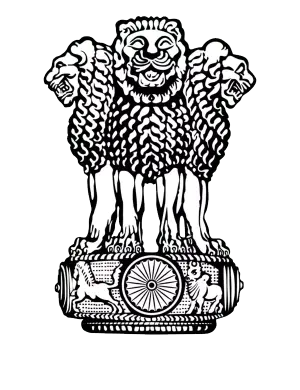
.webp)
.webp)
.webp)